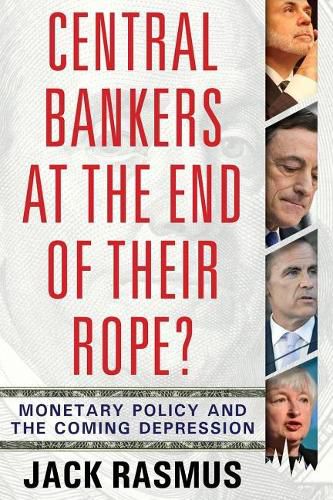Readings Newsletter
Become a Readings Member to make your shopping experience even easier.
Sign in or sign up for free!
You’re not far away from qualifying for FREE standard shipping within Australia
You’ve qualified for FREE standard shipping within Australia
The cart is loading…






Central banks are becoming a force of economic destabilisation in the 21st century - contrary to accepted notions of contemporary economic theory. The basic functions of central banks-whether managing money supply, supervising private banks, bailing out failing banks, stabilising prices, promoting real investment, employment and growth-have all entered a state of increasing decay, breakdown and failure. Central banks globally: have been losing control, individually and collectively, of the global money supply; progressively destabilised the global economy with decades of ever. rising liquidity and debt; chronically failed to prevent financial asset inflation bubbles or stop the steady drift toward deflation in goods, money and labour prices; I have been unable to adapt to technology forces that have fundamentally restructured the global financial system; effectively ignored the growth of- capital markets, inside credit and shadow banking; failed to regulate and supervise private banks that remain, post-2008, still addicted to high risk taking; proved unable to develop policies and tools to effectively stimulate investment, jobs, and real GDP; and failed to construct a stable system to replace the gold standard or the Bretton Woods international monetary systems. The book describes the fundamental causes of the breakdown and emerging crisis of central banks-with primary focus on the Bank of England, the Eurozone’s ECB , US Federal Reserve, the Bank of Japan, and the People’s Bank of China. The central theme is that central banks, as constituted today, are not only failing their basic functions-in the process becoming more desperate in experimenting with new measures and policies-but have become increasingly the vehicles of the interests of private bankers and investors. Central banks must therefore be democratised to represent the entire economy and not just bankers and investors. Proposals for institutional restructuring are offered as means to ensure central bank independence of both banker-investor interests as well as politicians.
$9.00 standard shipping within Australia
FREE standard shipping within Australia for orders over $100.00
Express & International shipping calculated at checkout
Stock availability can be subject to change without notice. We recommend calling the shop or contacting our online team to check availability of low stock items. Please see our Shopping Online page for more details.
Central banks are becoming a force of economic destabilisation in the 21st century - contrary to accepted notions of contemporary economic theory. The basic functions of central banks-whether managing money supply, supervising private banks, bailing out failing banks, stabilising prices, promoting real investment, employment and growth-have all entered a state of increasing decay, breakdown and failure. Central banks globally: have been losing control, individually and collectively, of the global money supply; progressively destabilised the global economy with decades of ever. rising liquidity and debt; chronically failed to prevent financial asset inflation bubbles or stop the steady drift toward deflation in goods, money and labour prices; I have been unable to adapt to technology forces that have fundamentally restructured the global financial system; effectively ignored the growth of- capital markets, inside credit and shadow banking; failed to regulate and supervise private banks that remain, post-2008, still addicted to high risk taking; proved unable to develop policies and tools to effectively stimulate investment, jobs, and real GDP; and failed to construct a stable system to replace the gold standard or the Bretton Woods international monetary systems. The book describes the fundamental causes of the breakdown and emerging crisis of central banks-with primary focus on the Bank of England, the Eurozone’s ECB , US Federal Reserve, the Bank of Japan, and the People’s Bank of China. The central theme is that central banks, as constituted today, are not only failing their basic functions-in the process becoming more desperate in experimenting with new measures and policies-but have become increasingly the vehicles of the interests of private bankers and investors. Central banks must therefore be democratised to represent the entire economy and not just bankers and investors. Proposals for institutional restructuring are offered as means to ensure central bank independence of both banker-investor interests as well as politicians.